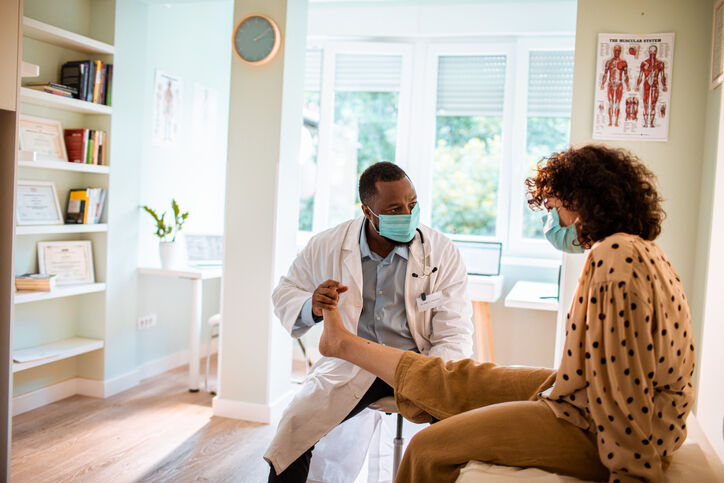
Ten Questions to Ask Your Vein Doctor Before Your Vein Treatment
Get to know your vein doctor (and make sure you’re in good hands!) by asking these ten questions before getting treatment:

Varicose veins are swollen, bulging, often uncomfortable blood vessels on the legs, ankles, or feet, just under the skin's surface. Caused by weakened or damaged valves inside the leg veins, varicose veins are a symptom of venous insufficiency (vein disease).
Despite being itchy, uncomfortable, and unsightly, varicose veins are not dangerous for most people. However, for others, vein disease can lead to serious health problems that can rob a person of their quality of life and be debilitating.
We spoke to Michael L. Aikens, MD, lead physician at Center for Vein Restoration (CVR) locations in Opelika, AL, and Montgomery, AL. He explained the importance of making—and keeping—your appointment to evaluate and treat problem veins. Dr. Aikens is an acclaimed cardiologist and was an assistant professor at the University of Alabama at Birmingham Medical School. He was attending physician at UAB Kirkland Clinic, attending physician at UAB hospital, and Director of the Cardio Care Unit at the Veterans Administration Hospital in Birmingham, before joining CVR in 2018.
Dr. Aikens says that it is important to understand some of the most important reasons for seeking vein care: prevent leg ulcers and decrease the risk of thromboembolic (blood clot) complications resulting from untreated varicose veins.
According to the National Center for Biotechnology Information (a part of the United States National Library of Medicine, a branch of the National Institutes of Health), “Venous thromboembolism (VTE) refers to the interrelated diagnoses of deep vein thrombosis (DVT) and pulmonary embolism (PE)… Thromboembolic events (blood clots) count among the most feared complications of hospitalizations… VTE poses a significant risk of added morbidity and mortality for a vast majority of the world’s population.”
Knowing that good vein health is essential to overall health, its curious that a patient suffering from symptoms of vein disease such as pain, swelling, cramping, darkening, or thickening of the skin, or leg ulcers would miss such essential healthcare appointments. However, Dr. Aikens outlines several factors for missed vein appointments, including financial concerns, fear of the unknown, and time away from obligations such as family and work.
To help patients overcome these barriers, at Center for Vein Restoration, “we make it convenient for patients to come to the office, offering before and after work, and evenings hours.” Vein treatment options at CVR take less than an hour to perform, and patients can return to their normal routine with few restrictions.
Dr. Aikens says that patients must consider the added costs of not treating problem veins when deciding whether to get treatment for problem veins. Delaying treatment could lead to ulcers and other significant health problems, which are more expensive and time-consuming to treat. Untreated varicosities put patients at five times higher risk of risky DVT, adds Dr. Aikens.
Treatment is covered by most insurances, including Medicaid and Medicare.
Patients sometimes question why multiple visits are needed to complete a treatment plan, says Dr. Aikens. The reason is that treatment plans require treating one vein at a time as part of a “quality assurance” process that ensures that there are no complications after a procedure. “Safety is the most important thing when it comes to your veins,” says Dr. Akins.
Dr. Aikens recalls patients who missed appointments for vein-related leg pain, only to come back later with leg ulcers that could have been avoided with early treatment. "Ulcers are more challenging to treat," says Dr. Aikens, "we don't mind fixing you while you have ulcers, but we would rather fix you before you have the ulcers."
For lymphedema patients, “missed appointments means that the swelling gets worse and can result in a decreased ability to perform daily routine activities,” warns Dr. Aikens.
While ulcers themselves don't cause a patient to lose their leg, they can lead to a limb-threatening infection, says Dr. Aikens. He emphasizes that this caused his patients more time away from work and more financial strain, adding, “we want to fix those veins before they become ulcers.”
"Compression stockings are not a fix, but rather a temporary band-aid for venous insufficiency (vein disease). Once you take them off, it allows reflux to return."
Reflux is the reversal of blood flow in the legs caused by weak or faulty vein valves that causes swelling, leg cramps, throbbing, itchiness, and varicose veins.
“CVR takes a total vein care, total leg care approach,” says Dr. Aikens. This means patients start with a comprehensive evaluation, including a thorough diagnostic ultrasound by a professionally trained technician experienced in detecting reflux. A board-certified physician skilled in the multitude of minimally invasive outpatient procedures can eliminate problem veins and treat ulcers and lymphedema.
He concludes: When your legs are achin’, come see Dr. Aiken!
Center for Vein Restoration has 100+ clinics throughout America, led by expert physicians focused solely on vein health. Patients can schedule online at their convenience or call 240-965-3915 to speak to a live patient services representative who can answer their questions or schedule an appointment at a location near you!